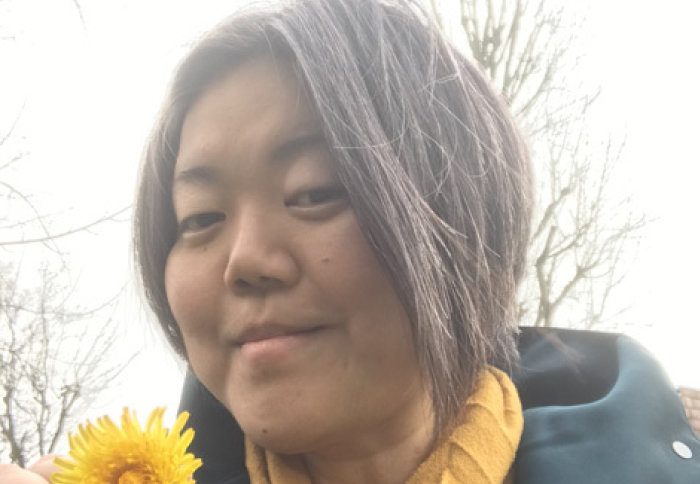#INWED20: Using novel Bioengineering research to understand living structures

Dr Naomi Nakayama joined the Department of Bioengineering as a senior lecturer in 2019
Dr Naomi Nakayama discusses the highs and lows of research in Bioengineering and the "aha!" moments that lead to big breakthroughs.
This International Women in Engineering Day, the Department of Bioengineering has profiled three lecturers from the department. We hope to provide you with an insight into the ground-breaking work that takes place in the UK’s leading bioengineering department through the eyes of the fantastic female bioengineers who are advancing research frontiers, using engineering to solve life sciences-related problems and creating future leaders.

Our next profile is of Dr Naomi Nakayama, (she/her) who joined the department in 2019.
Naomi's group, the Bio Form and Function Lab, studies the design features of living structures. As cells and organ forms are not random, there are universally found themes in them, such as slender cylindrical shapes. Her group are working to understand why these themes are so prevalent, and they apply their findings to sustainable biotechnology and agriculture, including biomimetics
How did you become a Bioengineer?
I hadn't called myself a bioengineer explicitly until recently, but I think I have always been one. As a kid, I would make boats and waterwheels with plants on the way to school, and I have always liked making, fixing, and problem solving. I was trained as a biologist originally, but I have always been drawn to the engineering mechanisms and features of living architecture.
What is a regular day in the life of a Bioengineer?
E-mailing, e-mailing, e-mailing. Just kidding (or am I?).
Well, on a satisfying day, I have good meetings with my group and collaborators about our research and/or have a good teaching session, and then spend the rest of workday solving all sorts of little problems together with students, colleagues and support teams. It’s a bonus if I can pop into the lab and see some experiments in action. On another type of satisfying days, I think and write all day, being immersed in a project.
What is your proudest professional achievement?
Occasionally, there is a time when the data we are getting doesn’t make sense, according to our initial inklings. We then spread all pieces of information all over my office or on a big table in a meeting room, stare at them and walk back and forth for hours like detectives in a crime drama. Usually by the end of the day we have an “Aha!" moment. I’m pretty proud of those breakthrough moments.
And of course - when my PhD students submit their thesis and pass viva, with all the training and learning they have had, I am immensely proud of their achievement.
How has being a woman shaped, influenced and impacted your career?
My career is an amalgamation of my nature, nurture, hard work, good and bad luck, so it is hard to pinpoint how being a woman influenced specific elements. However, I have been told that the way I steer my science, which tends towards being different, off-beat, and ‘wacky’ (I would like to consider it exploration-oriented and pathfinding, but hey), might come from the fact I am a woman and a woman of colour.
The first two labs that I spent a substantial amount of time in during my undergrad and postgrad days were led by incredibly talented and strong female scientists. Seeing them trailblaze through their days and years showed me how to be resilient. This helped me to find my way and inspired me into sticking to working in science.
How has being a part of the Department of Bioengineering shaped your approaches to your research?
What strikes me about the Department is its positivity, energy, and open-mindedness. It is a very diverse community, but we have this ‘oh that’s so interesting!’ attitude about each other’s work. There is a forward leaning attitude to expand the frontiers, rather than trying to stay within already established fields. This makes it a very exciting place to be and enables us to forge new research and innovation collaboratively. I am still new to the department, but I have already seen the genesis of interesting new projects and I am looking forward to seeing where they will lead.
What’s your advice for young women interested in the field of Engineering/Bioengineering?
If you step back and think about it, it is very puzzling why women are a minority in Engineering, especially in Bioengineering. Women tend to possess the qualities that make great engineers, for example being able to think systematically, understand others' needs, communicate well, work in a team, and are great with living organisms. Also, we are as good at maths and physics (yes we are, especially if we are given the opportunity and take the time for training). History and societal pressures are getting in the way. 'Raising above' them is very hard but hopefully things will get better in time. If you rise above these challenges, you may find your life’s calling and that is incredibly satisfying. If you are interested, go for it and know that there will be a lot of people who will help and support you, sharing your tears and laughter along the way.
Article text (excluding photos or graphics) © Imperial College London.
Photos and graphics subject to third party copyright used with permission or © Imperial College London.
Reporter
Miss Kemi Aofolaju (she/they)
Department of Bioengineering
